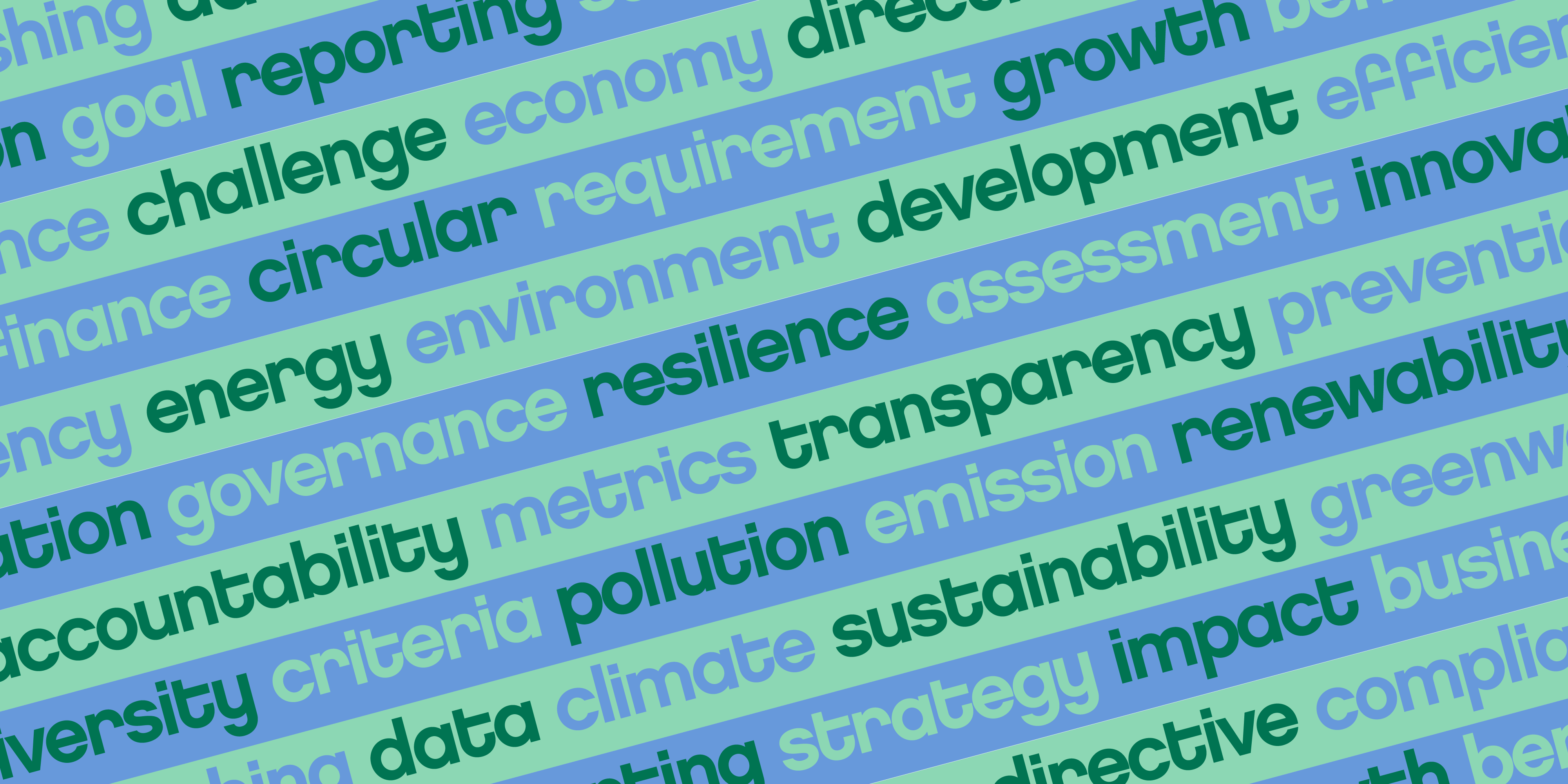
Sustainability
15 minute read
Are Nordic businesses more sustainability conscious?
The world’s most sustainable businesses are all Nordic, according to the recently published Global 100 Index. But is that chance, or is something more fundamental at work? And what do paganism, Nordic noir thrillers, and gender balance have to do with it? We set off on the trail for clues to find out the origins of the Nordic sustainability success.
Expect to learn:
How Nordic businesses differ from their counterparts elsewhere.
Some of the deeper reasons for the Nordic focus on sustainability.
Why transparency plays such a key role in Nordic corporate life.
How business leaders can incorporate some of these mindsets.
It’s one of the most talked-about mysteries in business.
Why do Nordic countries – the Scandinavian trio of Sweden, Denmark and Norway, plus Finland – lead almost every table when it comes to sustainability?
Of the world’s three most sustainable companies in this year’s Global 100 ranking, one (Neste) is from Finland, and two – renewable energy company Ørsted and bioscience company Chr. Hansen – from Denmark. In the same week in January 2020, the Helsinki Stock Exchange ranked Number One in the world for sustainability disclosure, for the second year in a row, while most other stock exchanges flatlined. Meanwhile, Nordic business schools are over-represented in the judges’ submissions and selections for the Financial Times Responsible Business Education Report, published in October. At the time of writing, the Nordics head the race to achieve the UN’s sustainable development goals by 2030.
The Nordics lead the world in cutting carbon emissions too. Nordic leaders are committing not just to carbon neutrality (Finland by 2035 and Sweden by 2045); but to carbon-negative status by 2050. Corporate Knights, the transparency organisation that publishes both the Global 100 Index that ranks the most sustainable corporations and the disclosure rankings for global stock exchanges, have pointed out that Nordic countries are over-represented at the top of the sustainability rankings. And if we want to go wider? The very phrase ‘sustainable development’ was coined by a Norwegian Prime Minister, Gro Harlem Brundtland, in the context of her UN commission, in the 1980s.
There is clearly something about Nordic companies when it comes to sustainability. But just what is that something?
Why do Nordic businesses, governments and initiatives seem to over-achieve on every scale of sustainability going? Is it circumstantial? Is it attitudinal? Cultural? Economic? Political? Something in the air?
These questions matter. Because if we can unravel just what it is that makes Nordic cultures – business and social – to think more sustainably, then we can begin to understand what deeper shifts might need to take place elsewhere for similar success.
But working out why businesses behave as they do is always tricky. And with something like sustainability – so bound up with everything from culture to available natural resources – it can be a frighteningly complex riddle.
Digging deeper
If this were a movie, this would be where we follow hunches; get witness statements; look for clues. And as with all the best mysteries, there are plenty of false trails.
One common theory is that Nordic business sustainability mindsets are shaped by the close connection to nature people have growing up in the Nordics and that breeding an innate respect for nature. And that this tendency to cherish the natural world has, in turn, led to something that permeates business culture to the point of making businesses more sustainability focused.
This seems persuasive on the surface and has become almost an article of faith. Yet there would seem to be only a weak correlation, for instance, between countries who like to protect their natural environments (Switzerland and Argentina scoring extremely highly alongside Nordic countries), and countries whose business practices are most sustainable. This is especially so with sustainability assessed against a formulation known as ESG – Environmental, Social and Governance.
Even if a unique reverence for nature was a factor, it would only account for the Environmental element in that formulation. Whereas in fact, performance is strong across all three.
The thing is, like all easy answers to complex riddles, there’s the lingering suspicion that the “we love nature” argument almost prevents further investigation. That it stops us asking deeper questions, and finding more interesting, and persuasive, answers. A recent Financial Times report contained lots of anecdotes about Nordic mindsets, education, and business practices, but little on the reasons for any of them. And nothing in the way of hard, quantifiable fact.
Enter researcher Björn Preuss of the Copenhagen Business School. For years Preuss has studied the characteristics of Nordic businesses; or, more accurately, whether they have distinct characteristics and what they might be. Wary of unconscious bias in traditional methods – which typically includes asking people in companies to respond to surveys, and taking what they say about their own companies, countries and attitudes at face value – he has pioneered a different approach.
Preuss’s research uses machine learning algorithms to analyse publicly available online sources and detect the language used by and about businesses. Using this, he benchmarks Nordic companies against counterparts elsewhere. “This wouldn’t have been possible before the computational age,” he laughs.
There are echoes here with the Corporate Knights Global 100 sustainable corporations ranking, in which Neste was ranked third in the world – the third consecutive time the company earned a place in the TOP 3. This ready availability of crunchable data online has driven the transparency needed to see what companies are actually doing, not just what people put in surveys or press releases.
Preuss’s data trawl differs from the Corporate Knights ranking in one important way, however. It is accidental data – clues left behind by businesses in the course of what they are doing – and not necessarily intended to be read as a set of disclosures.However, Preuss’s findings do chime with the Global 100 Index in finding ‘Nordicity’ in terms of the business culture to be what Preuss calls ”to a high degree, predictors of a more sustainable business.”
‘Nordicity’ – some unusual theories
Preuss’s early findings add unexpected new dimensions that go beyond environmental explanations. And they include plenty of surprise twists. One intriguing theory is the possibility that gender characteristics may play a part.
Preuss’s research suggests that companies showing strong ”masculine” characteristics, such as competitiveness and focus on high status and salary map against less sustainable models and attitudes than those who show more ”feminine” characteristics, such as consultative approach, a focus on nurturing employees and so on.
Analysis of corporate sustainability against a number of other factors, says Preuss, ”supports the hypothesis that masculinity has a negative impact on the sustainability of a company. And [this may] account for a higher sustainable management in Nordic companies which have on average lower masculinity than the average European company.”
This balance in characteristics maps against better gender equality performance for the Nordics than the European average, with Sweden (1), Denmark (2) and Finland (4) all coming within the top five countries in the EU for gender equality (alongside the UK and France), with extremely high scores around work, money, knowledge and power. Moreover, Iceland, Norway, Finland and Sweden currently occupy the top four positions in the World Economic Forum’s 2020 Global Gender Gap Report’s equality ranking. For context, Belgium is in 27th place, and the USA a distant 53rd.
The social dimension
Yet there are more twists. Another factor in this lesser focus on competitive, atavistic traits may be the Nordic countries’ distinctive culture of social equality.
More equal distribution of income – between board and employees, for example – is a factor in more sustainable corporate governance, according to the research. And Nordic countries are among the world’s most equal in terms of distribution of income. The past decade’s critical shift in definitions of sustainability to encompass a more holistic picture by taking in metrics on ESG recognises board/shareholder-to-employee reward ratios and social impact as part of the sustainable business model.
This has seen countries whose societies value equality, and in which that equality, protected by law, impacts business models and practices, earn high sustainability scores.
Nothing to hide?
Yet another, and perhaps more surprising still, is the sense of transparency that Nordic countries have successfully cultivated.
The regional cultural preoccupation with transparency appears to run deep. One of the commonly cited characteristics for Nordic noir crime genre that took the world by storm recently was that much of it dealt, on some level, with the conflict between private and public; the sense that people know each other’s business, and that this to some degree a guarantor of safety. Trouble, says a report in The Economist, comes when ”curtains are drawn and doors are bolted”. And just as importantly, the crime is often just as much do with secrecy in business: The Economist notes that: ”[Stieg Larsson, for example] is a master at depicting the relationship between business, social hypocrisy and criminal behaviour.”
This sense that transparency and disclosure are a guarantor of safety and harmony appears in the business context too.
The Helsinki Stock Exchange’s number one position in the recent global sustainability ranking, accompanied by the findings, in the same ranking, is that other Nordic countries’ stock exchanges also commit to transparency with unusual vigour. The fastest disclosure of data for analysis in ranking sustainability come from the Copenhagen Stock Exchange (average lag of just 73 days between the end of the fiscal year and the release of annual sustainability data, with 66 percent of the companies listed disclosing their sustainability data within five months of year-end) and Stockholm (98 days) against a global average of 164 days.
Accountability and transparency is something that Neste mentions as one of the most important sustainability trends as well: ”As we enter the next decade, all organizations will need to embrace transparency in sustainability-related topics”, says Simo Honkanen, Neste’s Senior Vice President of Sustainability, Public Affairs and Communications, in a recent blog post. ”This would have to be the default approach moving forward.”
Unsurprisingly, perhaps, given this commitment to transparency and fairer distribution of income, Nordic countries are among the world’s least corrupt, and Norway, Finland and Sweden come in first, second and third respectively in the global press freedom index – with Denmark in fifth place.
A.D. Messelt of asset managers Alfred Berg states that a commitment to transparency is characteristic of the region’s corporate life. He describes Nordic political life – typically principled and campaigning, leading the way on everything from women’s rights to the fight against Apartheid – as having led to a mindset in private companies of having to walk the walk too; to be cleaner than clean, and avoid scandal – making their annual reports “a delight for an ESG analyst”.
Nature or nurture?
But among the deeper driving forces, is there, after all, something in the “connection to nature” hypothesis?
John Elkington is a world authority on corporate responsibility and sustainable development, often called the 'godfather of the sustainability movement’.
As well as founding partner and executive chairman of Volans, “a future-focused business working at the intersection of the sustainability, entrepreneurship and innovation movements”, he is an author, visiting professor at Cranfield University, Imperial College and University College London, and sits on the World Wildlife Fund’s council of Ambassadors. He’s also the chair of Neste’s Sustainability Advisory Committee.
Elkington believes there’s more to the talk of a close connection to nature than simple appreciation of nature’s beauty; and that such a sustainability mindset can be born of darker stuff.“
There is something in the connection to nature, but it’s not quite that simple. I’m talking about looking at the deep history of the Nordics, and what forms that sense of responsibility for the environment,” he says.
“Some of it goes back to the religious wars and famines in Europe hundreds of years ago; and the Nordic countries being on the margins of that. And events like the sizable exodus of Norwegian people to the Pacific Northwest for example, really because they ran out of food. The soil is also much thinner than it is in much of Central Europe, and the UK for example. These are mostly shield countries, in which the soil sits on granite. So for example if you have acid rain, you notice it a lot quicker.
”Elkington recalls working trips to monitor acidified lakes in Scandinavia. “You are more exposed to the potential brutality of nature. And in the north particularly, you are at the point where living with it is less easy, and people have been exposed to nature in a very practical way.”
“These are all countries with small populations, too – the size of middle-sized cities elsewhere,” he continues. “So people are quite directly linked. And that changes your thinking.”
Louise Kjellerup Roper, the Danish CEO of Volans, takes up the point on population. But it’s not just population size that she argues has shaped the mindset.
“There’s certainly something in the size and connectedness of the population. These are all countries whose populations have been extremely homogeneous,” she says. “And that has meant that there are agreed values that everyone adheres to. And when you visit, but especially when you live there, you feel that there are very clear sets of expectations, around what you can expect from people, and society as a whole. There is that clear value set.”
“One of the biggest shocks I’ve ever had was the first time I lived through an election after I had moved to the UK. The headlines in the media were all about calculating how much money you were going to get depending on what kind of person you were and who got elected. You would never get that in Danish society, or any of the Nordic countries. You’d have conversations about what kind of society you want to live in."
This discussion forms the basis for how businesses operate, Louise Kjellerup Roper argues. “There is not this sense in the Nordics that businesses are separate from society. We are all very much part of the same society. So for me, that’s the big difference to other regions: this big, fundamental discussion of values that involves everyone, of what society is. You are a part of those discussions whoever you are; it’s not just a topic for an intellectual elite. And this is because the societies are much smaller and more homogenous, compared, say, to Britain and the United States."
So does that more direct connection – to the people around you, to the environment, to the consequences of your actions – nurture an increased sense of accountability? Both Elkington and Kjellerup Roper agree it does, but again point to different contributing factors. Elkington looks again to history, pointing out the very personal, direct nature of religious awareness in the Nordics historically, with paganism and Protestantism both involving an unmediated relationship between the individual and the universal.
Kjellerup Roper’s personal experience growing up in Denmark calls back to mind some of Preuss’s findings. “There is a more, perhaps, feminine aspect to public life in the Nordics. Politics and business have a more consultative and collaborative approach – it’s less competitive and confrontational,” she says.
She also sees a mixed blessing in this heightened sense of agreed group norms. “There is a very definite feeling that one should conform to the agreed values of the group,” she says. “This is certainly true across Norway and Denmark as well as Sweden. And from that, it can feel that if you are different, you had better conform.”
Innovation for the greater good
One intriguing possibility is that this double imperative – the necessity of finding ways to live on meagre resources, while also being directly accountable to a closely knit group for one’s choices – acts as an incentive on the individual to think sustainably at all times.
A.D. Messelt suggests a ”Nordic capacity for innovation” as being part of what keeps the Nordics in front on sustainability, with Sweden, Finland and Denmark all making the Top 10 most innovative countries, at 2nd, 6th and 7th respectively on the Global Innovation Index. This innovation-mindedness has been described by Bengt Ståhl, former director at telecoms and engineering giant Teracom Sweden, as ”turning a handicap into an advantage”.”The land makes you innovative, because you have to innovate to survive,” he explained. “It’s what happens, for example, when you have long countries with lots of energy far up in the North, in hydroelectric, and all the people who need it way down in the South. You have to work out ways to get the energy from here to there efficiently. And once you do that, you have worked out how to transfer anything – phone signals, anything – with as little loss as possible.
”From social fairness to a less aggressive business culture; from gender balance to transparency; from campaigning politicians to innovation – these are a few of the reasons Nordic countries’ businesses appear, today, to have sustainability baked in.
Are there more factors? Undoubtedly. If cultures are collections of stories we believe about ourselves, then perhaps it’s even the case that the people of the Nordic countries have over the years bought into these stories, unconsciously creating a kind of Brand Nordic, to which they now feel the need to adhere.Perhaps the lesson of this story is that nothing is ever quite as simple as it seems. And that there is no one way to become inherently sustainable. But also that wider ranging cultural factors play an important part – in businesses as much as countries – in making people think, act and work sustainably.
As ever, the reality is more complex, and more rewarding than a simple “we love nature” conclusion. And it contains plenty that companies and business leaders everywhere can adapt and develop for themselves.Therein lies the Nordic story’s fascination. And for businesses across the world, its irresistible challenge.
Credits: Matt Potter, a British journalist, author, editor, broadcaster and scriptwriter.





